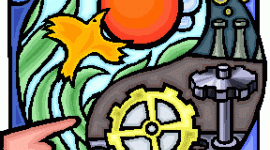Bruce Elkin on Simple Living
Interview with Bruce Elkin
Bruce Elkin, 55, is a simple living coach and a consultant to individuals, organizations and communities trying to live simple, yet rich lives in harmony with the systems of life that sustain us all. He is the author of the booklet, "Co-Creating Our Common Future" and the forthcoming book, "Living Well, Living Deeply." He is also Director of The Earthways Institute.
Tammie: What drew you to the Environmental movement?
Bruce: In 1973, I was hired by the Calgary Y to develop an environmental Ed curriculum for their new outdoor center. I did a survey of available programs, was disappointed by the either/or approach I found prevalent among those who thought hard science based conceptual understanding was the key and those who thought sensory appreciation and feelings for nature were the key. Then someone gave me a copy of Steve Van Matre's "Acclimatization: A Sensory and Conceptual Approach to Ecological Involvement." I read all SVM's stuff, joined the Institute for Earth Education, eventually became the senior trainer and, that was the start. Later, I developed my own approach incorporating Van Matre's ideas and ideas about personal empowerment, growth and transformation. Over the years, this led me to set up the EW Inst.
Tammie: In examining your own experiences with 'simple living,' what have you found the most significant challenges and rewards to be?
Bruce: The most challenging aspect is how to make a living. I've been living simply most of the time since 1973, trying to keep my income at a "just enough" level. But, figuring out what "just enough" is, is tough. Sometimes I make enough, sometimes I don't. The most troublesome challenge is walking the fine line between voluntary simplicity and involuntary poverty.
continue story below
The other challenge is not giving in to the opportunities to make the big bucks. A couple of times, I've headed off to teach myself new skills (coaching, consulting, etc) and did so well I was tempted to just keep at it to bring in the big bucks, sock them away in an FI fund (a la Your Money or Your Life?), but I found that when I did that kind of work, my expenses went way up (marketing, promotion, new clothes, nice car, air fare for travel, hotels in the city, all the things you need to do to appear a successful consultant). In the end, I didn't take home much more money than I did when I lived close to the bone, so I bagged most of that stuff. Now I only do work for groups I like and only occasionally.
The thing I like best about living simply is the time and freedom it gives me to create (write, relationships,) and to be in the natural world appreciating where I live.
Tammie: In your article, "Living Well, Living Deeply," you assert that lasting change requires "more than mere surface changes in behavior..." but re-arranging "the deeper elements underlying our actions." If you were to explain what you mean by this to an adolescent, what would you say?
Bruce: There are some things that adolescents can't or are not ready to hear, especially those under 15 years. There is a brain growth spurt at +/-14. Before that growth happens, they are still very concretely focused. Some of the structural stuff I work with just goes over their heads. When I do talk to older adolescents about this stuff, I talk about the difference between long-term goals/desires that really matter and short-term demands and how to organize your response to short-term demands so it both gives you what you want now and supports your long term desires. They usually get that.
Tammie: What are the "basic processes underlying the ability to create?"
Bruce: The basic processes underlying the ability to create are:
1. Knowing what you want, being able to envision a completed result in enough detail that you would recognize it if you created it.
2. Knowing what you have, being able to ground yourself in an objective and accurate description (not judgment!) of current reality, i.e. where you are starting from, what you have working for you, against you, what skills, resources, talents, experience etc you have or do not have.
3. The capacity to hold Vision and Current Reality together in your mind at the same time and to live/work comfortably in the gap between Vision and Reality as you craft your creation/desired result step by step.
4. A hierarchical set of choices wherein day to day choices support strategic goals and objectives and strategic goals support long-term purposes and your life mission.
5. The capacity to learn from doing, to try, note results, learn, make adjustments and try again.
6. Momentum: through consistent action, even wrong actions, you keep the momentum flowing. Over time it becomes a force which helps you move toward completion. The key is to always know your next steps, where you're going after you've done the step you're on now.
7. Completion: finishing fully, adding touches and details, making the creation fit the vision in your mind of what it looks like done.
8. Receiving: becoming a non-attached observer/critic of your creation. Being willing to live with its greatness and its faults without seeing either as reflective on you.
9. Using the energy of completion to begin your next creation.
Tammie: Has there been a particular transformative experience in your own life?
Bruce: I'm not a fan of cataclysmic theories of change. I don't think in terms of breakthroughs to higher levels (except in terms of chaos theory's bifurcations, but those are beyond my full understanding), I don't think in terms of quick fixes. I think more in terms of how nature usually works, slowly, consistently, patiently building things up over time. That's also how most art, literature, music, etc is created, step by step, poco a poco. My life has worked that way. No big quakes or shifts, just slow, incrementally building, growing learning over time. Eventually I've found myself miles from where I began.
Tammie: Do you believe that it's possible that we may be experiencing a global 'quake?'
Bruce: It is possible that the earth system is becoming so chaotic that we're about to experience a chaotic bifurcation, but I don't think anyone really knows if this is true or not. I think it is more likely that we're gonna continue muddling on, new things will emerge out of the mix, some will take, some will fall away and we'll gradually move closer to what we all really want. Wendell Berry said about learning to live where you are - Love the neighbors you have, not the ones you wish you had.) I think the key thing for all of us to do is not put our faith in big, sudden shifts but to settle in to our selves, our communities and our world for the long haul. We need to learn to be happy with and to want what we have! We need to love the world we have and work hard to bring into being the things we want in that world. And ourselves!
Tammie: What concerns you the most about our 'collective future,' what gives you the most hope?
Bruce: Not much concerns me about our future, because all the world is way out of my control. I am hopeful that the human spirit, which is part of nature's grand, intelligent complexity, will soar high enough to help our species realize that we are, indeed, just plain citizens of the biotic community and to begin to re-invent our lives, business and communities to fit into that biotic community in harmony with the systems that sustain all life. We may have to do some more real dumb stuff, screw up big time here and there, before everyone "gets it". But, I think we will, eventually. By we I mean humanity, our kids and their kids and their kids kids. In the meantime, I'm trying very much to enjoy what I have, the only life I'm likely to get.
next: On the Death of a Child
APA Reference
Staff, H.
(2008, December 4). Bruce Elkin on Simple Living, HealthyPlace. Retrieved
on 2026, January 25 from https://www.healthyplace.com/alternative-mental-health/sageplace/bruce-elkin-on-simple-living

